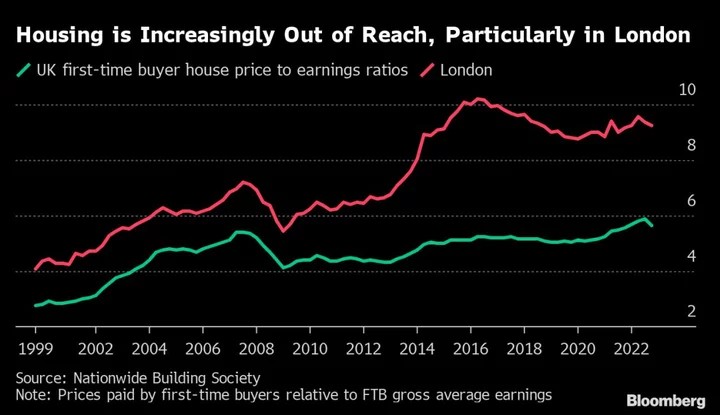The age of huge UK property price increases may be coming to an end as population growth slows and working from home booms, according to a senior economist at the Office for Budget Responsibility.
David Miles, one of three members of the UK budget watchdog’s top committee, said that changing working habits, a flattening population and an end to a decades-long fall in borrowing costs make explosive house price growth less likely.
“Those forces driving them up are going to be much weaker, I suspect, in the next 40 years than they have been in the past 40 years,” he said in a speech at an Economic Statistics Centre of Excellence conference in London. “If anything, this unusual age of massive rises of house prices may be nearing an end.”
Miles, who was also on the Bank of England’s Monetary Policy Committee, said the UK has suffered particularly rapid house price growth compared with other countries because it suffered from a weaker supply of housing as well as a bigger fall in real interest rates. He described interest rates as the “major driver” in recent decades but added that demographics and working from home will become key factors.
“You get this house price gradient that the further you move from the center where many jobs are and commuting times become greater, then house prices tend to drop off,” he said. But those people working from home will find it “more attractive to live further away,” changing the “economics of location” for those workers.
A model by Miles looking at the impact of a potential shift of workers who can work from home suggests a “pretty substantial decline in the price of land in the areas where most people were living before the change” and a less substantial impact on house prices.
“The decline in house prices is actually not at its greatest right at the center but it’s a bit further out,” he said. “[There’s a] previous suburban edge where house prices fall even more than in the center.”
The lack of housing has become a politically contentious issue since the government dropped plans for mandatory construction targets to fend off a rebellion by backbench Conservative members of Parliament last year. The government is already falling far short of its pledge to build 300,000 new homes each year.
UK INSIGHT: Housing Correction Finally Done? Model Says ‘No’ (1)
Prime Minister Rishi Sunak is facing new calls to promote home building after the UK’s housing crunch was blamed for contributing to the Tories’ widespread losses in local elections earlier this month when it lost more than 1,000 council seats. Following the votes, Labour — which backs targets — became the largest party in local government.
On Wednesday, opposition leader Keir Starmer said the Labour Party — which holds a double-digit lead over the Tories in opinion polls — would reform the planning system and change rules to accelerate housebuilding if it wins the next general election.
For his part, Miles said the pressure for more houses will ease as the population grows more slowly.
The problem of building enough houses has “clearly been rather acute over the last 40 years because the population of the UK has gone up a great deal,” he added.
(Adds context on working from home)

